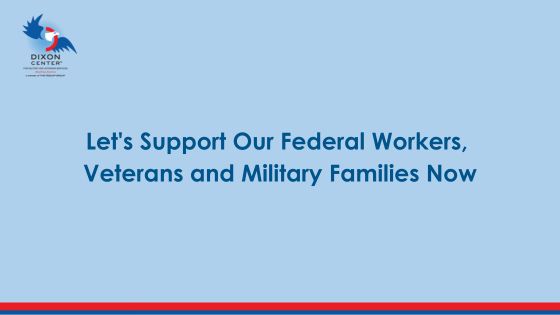Let’s Support Our Federal Workers, Veterans and Military Families Now

Neglecting Emotional and Social Wellness During Government Shutdowns Leads to Lasting Consequences
Introduction
Government shutdowns can disrupt the lives of millions of Americans, with federal workers, veterans, and military families among those most severely affected. While financial and operational challenges are immediately visible, a shutdown also threatens overall well-being in profound ways.
The eight dimensions of wellness—emotional, social, physical, intellectual, occupational, spiritual, environmental, and financial—offer a comprehensive framework for understanding health. When emotional and social wellness are neglected, especially during government shutdowns, individuals in vulnerable populations may experience heightened loneliness, isolation, and addiction.
The Eight Dimensions of Wellness
The eight dimensions of wellness provide a holistic understanding of health. These dimensions include:
- Emotional Wellness: Coping effectively with life and fostering satisfying relationships.
- Social Wellness: Building connections, nurturing a sense of belonging, and developing a robust support system.
- Physical Wellness: Attending to physical activity, nutrition, sleep, and overall bodily care.
- Intellectual Wellness: Recognizing creative abilities and pursuing opportunities to expand knowledge and skills.
- Occupational Wellness: Deriving personal satisfaction and enrichment from one’s work.
- Spiritual Wellness: Developing purpose and meaning in life.
- Environmental Wellness: Living in environments that encourage well-being and stimulate good health.
- Financial Wellness: Being content with present and future financial circumstances.
Emotional and Social Wellness: Critical Yet Overlooked
During government shutdowns, emotional and social wellness often take a backseat. Federal workers, veterans, and military families face uncertainty, anxiety, and disruptions to not just their paychecks but also their daily routines. As a result, emotional wellness declines as individuals deal with stress and concerns about their livelihoods, while social wellness suffers due to reduced opportunities for interaction and community engagement.
Consequences of Neglect
Loneliness and Isolation
Government shutdowns can isolate employees and their families, cutting them off from regular social connections. For veterans and military families, frequent relocations and disruptions intensify this isolation, increasing the risks of depression, anxiety, and other mental health challenges.
Addiction
Without adequate support for emotional and social wellness, individuals may turn to unhealthy coping mechanisms. Rates of substance abuse and addiction can rise as people seek relief from stress, boredom, and feelings of abandonment. Veterans—especially those with past trauma or service-related challenges—are particularly at risk during extended periods of uncertainty.
Homelessness
The combination of loneliness, isolation, and addiction can lead to homelessness for federal workers, veterans, and military families. National statistics indicate that veterans comprised about 11% of all homeless adults in the United States in 2023. Substance abuse is both a cause and a result of homelessness, with approximately 38% of homeless individuals dependent on alcohol and 26% abusing other drugs. This cycle of isolation, addiction, and lack of support can quickly erode financial stability and social networks, resulting in loss of housing.
During crises like government shutdowns, these vulnerabilities are intensified. Without intervention, emotional distress can lead to deeper isolation, increasing the risks for addiction and homelessness. Comprehensive support systems are urgently needed to address both immediate financial concerns and underlying emotional and social challenges.
Unique Challenges for Federal Workers, Veterans, and Military Families
- Federal Workers: Sudden income loss, job insecurity, and reduced workplace support contribute to anxiety and withdrawal.
- Veterans: Shutdowns increase vulnerability while disrupting access to vital services, especially as many rely on federal programs for support and healthcare.
- Military Families: Frequent moves and separations already challenge social wellness; shutdowns intensify stress and instability.
Addressing the Problem
To mitigate these negative outcomes, it is essential to prioritize emotional and social wellness during government shutdowns. Key strategies include:
- Providing access to mental health resources and counseling.
- Facilitating virtual support groups and community engagement activities.
- Encouraging healthy coping methods such as exercise, mindfulness, and creative pursuits.
- Ensuring clear communication and timely updates from government agencies to reduce uncertainty.
- Supporting organizations that serve veterans and military families to maintain continuity of care.
Supportive Services for Veteran Families (SSVF) are especially crucial during government shutdowns. SSVF’s services include housing assistance programs, financial counseling, and employment support tailored for veterans and their families. Organizations also provide case management, help navigating VA benefits, and connections to local resources that address both immediate and long-term needs. Outreach programs focus on mental health care, crisis intervention, and peer support networks, helping veterans and their families maintain stability and well-being during challenging periods.
By utilizing these supportive services, veteran families impacted by the government shutdown can access guidance, emotional support, and practical solutions to cope with disruptions in federal programs. This holistic approach helps mitigate stress and anxiety while fostering resilience and empowering families to thrive even during times of uncertainty.
Key Organizations Supporting Wellness During Shutdowns
Several organizations provide vital support for the emotional and social wellness of federal employees, veterans, and military families during government shutdowns. The Federal Employee Education & Assistance Fund (FEEA) delivers emergency financial assistance and counseling for federal workers facing hardship. The Department of Veterans Affairs (VA) offers telehealth counseling, crisis intervention, and virtual peer support networks for veterans. Military Family Advisory Network (MFAN) and Blue Star Families organize online support groups, wellness workshops, and community activities to help military families manage stress and uncertainty. The National Alliance on Mental Illness (NAMI) also offers dedicated programs and helplines accessible to all affected groups, providing guidance and emotional support during unstable times.
Large healthcare systems such as Cardinal Health, Henry Ford Health, ProMedica, and Inova play a crucial role by offering medical and behavioral health services for federal employees and veterans during shutdowns. These organizations maintain hotlines, telehealth appointments, and outpatient clinics to ensure continued access to mental health specialists, addiction recovery programs, and crisis resources. By collaborating with national and local support groups, these providers help individuals address emotional challenges, manage addiction, and connect with resources that foster resilience during uncertainty.
SSVF providers are essential partners in assisting veteran households during government shutdowns and other periods of uncertainty. Organizations like Soldier On deliver a wide range of services, including rapid rehousing, homelessness prevention, and case management for veterans and their families. SSVF providers help veterans access housing resources, financial planning, and legal assistance, ensuring that those at risk of homelessness receive timely intervention and support. They also coordinate with local shelters, landlords, and community agencies to stabilize housing situations and connect families to long-term support networks. By offering flexible, client-centered services, SSVF programs play a pivotal role in maintaining stability and promoting overall wellness for veterans and their loved ones during times of federal disruption.
By reaching out to these organizations, individuals can access tailored resources that promote resilience and ensure continuity of care, even when government operations are disrupted.
Conclusion
Neglecting emotional and social wellness during difficult times, including the current government shutdown, has lasting and severe effects on federal workers, veterans, and military families. Recognizing and actively addressing these dimensions can reduce loneliness, isolation, and addiction – and even help build resilience – during crises.

